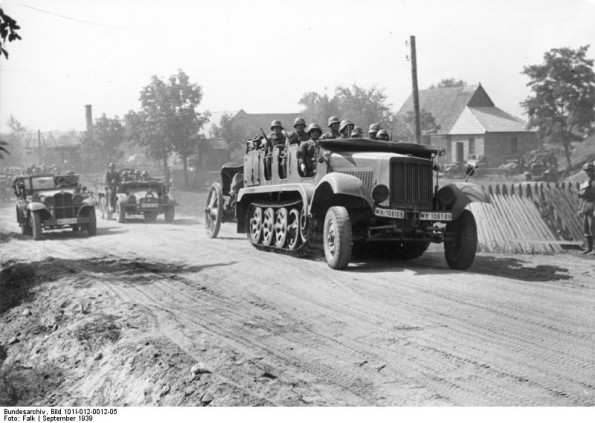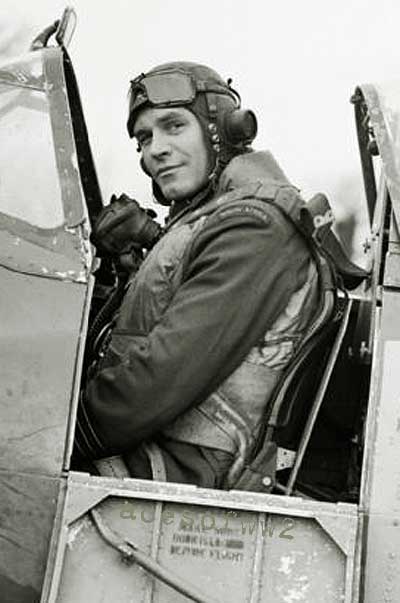Wednesday 6 September 1939
 |
| German troops advancing on Krakow (Falk, Federal Archive). |
European Air Operations: The first RAF pilot (Pilot Officer Montague Hulton-Harrop) dies during the conflict. Tragically, it is a friendly fire incident along the east coast and becomes known as the Battle of Barking Creek. This involves the mistaken interception and shooting down of two British Hurricanes by 74 Squadron operating out of Hornchurch Airfield. Only one of the pilots dies. The Luftwaffe, in fact, does make a reconnaissance flight along the coast and then turns back, but that is not the cause of the mistaken alarm.
The disastrous incident is the result of inexperience. There were almost 200 RAF fighters in the air and no enemy. The two British victims were operating together away from the main formation. There was a court-martial and the papers remain sealed to this day, but the 74 Squadron pilots who shot down the British planes were exonerated. The commander of 56 Squadron operating out of North Weald Airfield in Essex, who had over-reacted to the report of an enemy sighting and was the commander of the dead man, however, was replaced.
There also are unconfirmed reports of a Luftwaffe raid towards Paris that is turned back by French fighters.
Western Front: French troops make s small advance toward Saarbrücken. There is contact all along a 125-mile span heading south from Luxembourg.
Battle of Poland: The Germans under General Wilhelm von List's 14th Army take Krakow. Other German forces take Różan. Elsewhere, after several days of fighting, the German SVI Army Corps takes Góry Borowskie and Rozprza. Col. Ludwik Czyżewski of the Polish 2nd Legions' Infantry Regiment, who has been reinforced by some light tanks, orders a retreat toward Dłutów. Fighting is fierce because the axis of the German attack is toward the key cities of Radomsko, Piotrków Trybunalski and Bełchatów. The XVI Panzer Corps (1st and 4th Panzer Divisions) of the German 10th Army resumes its advance after taking Piotrkow.
The Germans are pushing the Poles back in most places. The Polish high command issues an order for a general retreat to the Narew-Vistula-Sun rivers.
Battle of the Atlantic: Norddeutscher Lloyd cargo ship SS Minden, 4301 tons, is loaded in Brazil and leaves port for a journey back to Germany. This is a mysterious departure with questions that still linger. There is a theory - unproven but assumed by many to be true - that the Minden is loaded with up to four tons of gold. The story is that officials from Banco Germanico, a subsidiary of German Dresdner Bank, assist with loading special crates on the ship that contain this German gold. The ship's route is planned to take it just south of Iceland and then around Great Britain, then down through Norwegian coastal waters, to avoid the Royal Navy (see 24 September 1939).
Polish Government: The Polish government leaves Warsaw for Lublin.
British Government: The Armed Forces Act combines all British military forces into the British Army.
Future History: The Battle of Barking Creek (the name given to the 6 September 1939 air battle because that was used generically by British comics as a kind of synonym for military blunders) involved Adolph "Sailor" Malan, a South African. He was the leader of 'A' Flight of 74 Squadron. Malan allegedly gave the order to engage the British victims. One of the men who opened fire was Flying Officer Vincent 'Paddy' Byrne, the other was Pilot Officer John Freeborn,. Helping to defend the pilots at the court-martial was Roger Bushell. Everyone was exonerated.
Bushell and Byrne later wound up incarcerated together at Stalag Luft III and helped to mastermind "The Great Escape." Bushell, portrayed as the mastermind of the entire operation in the 1963 film, was murdered during that escape. Byrne, however, was repatriated in 1944 and subsequently given a ground position.
Malan became an excellent pilot, getting 27 kills and rising to be a Group Captain. He received the Distinguished Service Order and bar and the Distinguished Flying Cross. After the war, he worked against the Apartheid regime.
Freeborn, who was found to have mistakenly killed the British pilot, rose to become a Wing Commander. He ultimately flew more operational hours than any other British pilot during the Battle of Britain and received the Distinguished Flying Cross and Bar. Freeborn passed away on 28 August 2010, regretting the incident to his dying day.
 |
| Sailor Malan. |
September 1939
September 1, 1939: Invasion of PolandSeptember 2, 1939: Danzig Annexed
September 3, 1939: France, Great Britain Declare War
September 4, 1939: First RAF Raid
September 5, 1939: The US Stays Out
September 6, 1939: Battle of Barking Creek
September 7, 1939: Polish HQ Bugs Out
September 8, 1939: War Crimes in Poland
September 9, 1939: The Empire Strikes Back
September 10, 1939: The Germans Break Out
September 11, 1939: Battle of Kałuszyn
September 12, 1939: The French Chicken Out
September 13, 1939: The Battle of Modlin
September 14, 1939: Germany Captures Gdynia
September 15, 1939: Warsaw Surrounded
September 16, 1939: Battle of Jaworów
September 17, 1939: Soviets Invade Poland
September 18, 1939: Lublin Falls
September 19, 1939: Germans, Soviets Hook Up
September 20, 1939: the Kraków Army Surrenders
September 21, 1939: Romania Convulses
September 22, 1939: Joint Soviet-German Military Parade
September 23, 1939: The Panama Conference
September 24, 1939: The Luftwaffe Bombs Warsaw
September 25, 1939: Black Monday for Warsaw
September 26, 1939: Warsaw on the Ropes
September 27, 1939: Hitler Decides to Invade France
September 28, 1939: Warsaw Capitulates
September 29, 1939: Modlin Fortress Falls
September 30, 1939: Graf Spee on the Loose
2019


